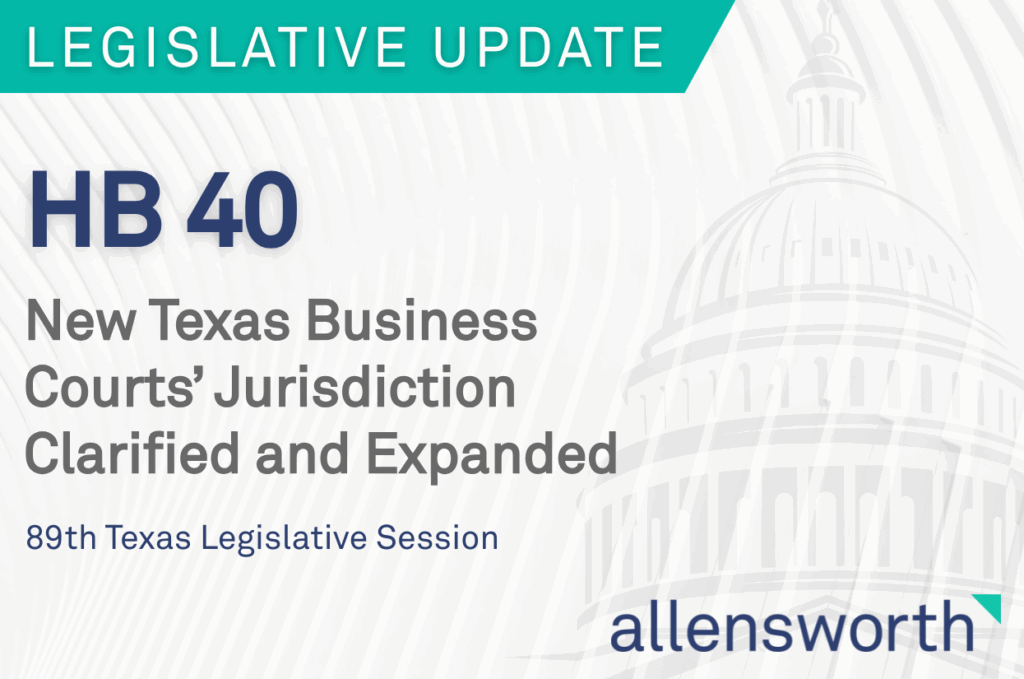
Effective September 1, 2025, HB 40 expands the jurisdiction of the Texas Business Courts, lowering the amount in controversy for certain covered disputes commenced on or after September 1, 2024, and permitting parties to agree to jurisdiction regardless of when their case was filed. For the construction industry, this expansion may open a new forum for certain high-value disputes—potentially altering litigation strategy, forum selection, and case outcomes.
Background: The Texas Business Courts. In 2023, the Texas Legislature created Chapter 25A of the Texas Government Code, establishing the Texas Business Courts. These specialized courts (limited to the five funded divisions of Austin, Dallas, Fort Worth, Houston, and San Antonio) began hearing cases on September 1, 2024, involving complex business disputes—including several arising from construction.
Disputes may only be heard in the Business Courts if they satisfy the jurisdictional requirements set forth by statute. The most common way a construction dispute might qualify for Business Court jurisdiction is through a dispute arising from a “qualified transaction,” as defined in Chapter 25A. Under the original 2023 statute, a “qualified transaction” was defined as a transaction with an aggregate value of $10 million. If a dispute arose from a “qualified transaction” and the amount in controversy exceeded $10 million, the dispute met the Business Court’s jurisdictional requirements. Once the Business Court exercised jurisdiction over such a claim, other related claims—which otherwise would not have satisfied the jurisdictional requirements—could also be filed upon the agreement of all parties, as well as the judge.
HB 40. The Texas Legislature passed HB 40 during this 89th Legislative Session, which amended Chapter 25A of the Texas Government Code and multiple provisions of the Texas Civil Practice & Remedies Code. Effective September 1, 2025, and applying only to civil actions commenced on or after September 1, 2024, HB 40 expanded access to the Business Courts, lowering (1) the minimum amount in controversy to $5 million for most disputes; and (2) lowering the minimum aggregate value for disputes arising out of “qualified transactions” to $5 million. HB 40 also clarified that the amount in controversy includes the total value of all joined parties’ claims, and that the value of a “qualified transaction” may be calculated based on the aggregate value of “a series of related transactions,” rather than a single transaction.
Prior to HB 40, the Business Courts did not have jurisdiction over any civil actions commenced prior to September 1, 2024—even if all parties agreed. Now, under HB 40, parties may transfer their cases to the Business Courts by agreed motion, regardless of when the action was originally filed.
The bill also conferred concurrent jurisdiction on the Business Courts over actions to enforce an arbitration agreement, appoint an arbitrator, or review an arbitral award, as long as a claim included in the controversy in arbitration otherwise meets the Business Court’s jurisdictional requirements. Because construction disputes often include disputes over the arbitrability of claims, this expansion of jurisdiction may result in parties litigating these issues before the Business Courts more often.
Construction Litigation in the Wake of HB 40. The expanded jurisdiction of the Business Courts carries significant implications for the construction industry. Under the new framework, disputes may more easily meet the amount in controversy requirement, as courts will add together the value of all parties’ claims. In determining whether something is a “qualified transaction,” such courts can now add together the value of all related transactions in a dispute. Although the bill does not define “series of related transactions,” and Texas law does not otherwise provide clarity on how courts will define that term going forward, we anticipate parties to construction contracts may increasingly attempt to move disputes to the Business Courts when the total value of the construction project exceeds $5 million, even if that party’s individual contract falls short of this amount.
Additionally, prior to HB 40, the Texas Business Courts did not have jurisdiction over civil actions to foreclose on a lien on real or personal property unless the claim fell under the Business Court’s supplemental jurisdiction. Now, these courts explicitly do not have jurisdiction over any claims seeking to foreclose on a lien on real or personal property that an individual owns at the time the action is filed, unless certain requirements are met.
As more construction disputes qualify for Business Court jurisdiction, construction stakeholders should weigh whether to file their claims in these specialized forums and revisit contract-structuring and dispute-resolution clauses with an eye towards opting in—or out—of jurisdiction.